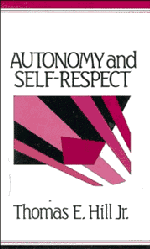Book contents
- Frontmatter
- Contents
- Sources and acknowledgments
- Introduction
- 1 Servility and self-respect
- 2 Self-respect reconsidered
- 3 Autonomy and benevolent lies
- 4 The importance of autonomy
- 5 Symbolic protest and calculated silence
- 6 Moral purity and the lesser evil
- 7 Self-regarding suicide: a modified Kantian view
- 8 Ideals of human excellence and preserving natural environments
- 9 Weakness of will and character
- 10 Promises to oneself
- 11 Social snobbery and human dignity
- 12 Pains and projects: justifying to oneself
- 13 The message of affirmative action
- Index
3 - Autonomy and benevolent lies
Published online by Cambridge University Press: 05 June 2012
- Frontmatter
- Contents
- Sources and acknowledgments
- Introduction
- 1 Servility and self-respect
- 2 Self-respect reconsidered
- 3 Autonomy and benevolent lies
- 4 The importance of autonomy
- 5 Symbolic protest and calculated silence
- 6 Moral purity and the lesser evil
- 7 Self-regarding suicide: a modified Kantian view
- 8 Ideals of human excellence and preserving natural environments
- 9 Weakness of will and character
- 10 Promises to oneself
- 11 Social snobbery and human dignity
- 12 Pains and projects: justifying to oneself
- 13 The message of affirmative action
- Index
Summary
Often it is easy to see what is wrong with lying. Many lies are vicious: they are meant to hurt, and often do. Other lies are self-serving at the expense of others: they gain something for the liar but are detrimental to those who are deceived. Even well-intentioned lies are sometimes discovered, with consequent damage to valued relationships and to trust and credibility in general. Many lies are violations of professional obligations; others are breaches of promise to particular individuals. But there are also instances in which these explanations do not seem to apply and yet the lie is still not beyond moral question. We feel that there is at least something to be said against lying even then, but it is not obvious what this is. No promises or professional commitments are at stake; no harmful consequences are intended or expected; and yet the lie still seems at least prima facie objectionable. We naturally wonder, “why?” To rest the matter with the intuitive remark that truth-telling is always a prima facie obligation is hardly satisfying. To say that killing, maiming, and causing pain are prima facie wrong may arouse no further questions; but why, one wonders, should truth-telling be viewed this way, especially when a lie seems likely to result in more good than harm?
- Type
- Chapter
- Information
- Autonomy and Self-Respect , pp. 25 - 42Publisher: Cambridge University PressPrint publication year: 1991
- 7
- Cited by



